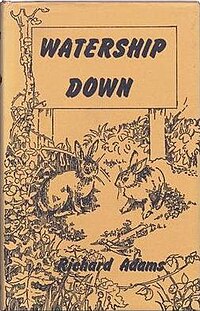 Rabbits (says Mr. Lockley) are like human beings in many ways. One of these is certainly their staunch ability to withstand disaster and to let the stream of their life carry them along, past reaches of terror and loss. They have a certain quality which it would not be accurate to describe as callousness or indifference. It is, rather, a blessedly circumscribed imagination and an intuitive feeling that Life is Now. A foraging wild creature, intent above all upon survival, is as strong as the grass.
Rabbits (says Mr. Lockley) are like human beings in many ways. One of these is certainly their staunch ability to withstand disaster and to let the stream of their life carry them along, past reaches of terror and loss. They have a certain quality which it would not be accurate to describe as callousness or indifference. It is, rather, a blessedly circumscribed imagination and an intuitive feeling that Life is Now. A foraging wild creature, intent above all upon survival, is as strong as the grass.I went on vacation last week, and decided that I didn't want to muck around with something I wasn't sure I would like or might find too grim. I got through a few chapters of Sister Carrie and liked it, but a realist novel about the hardships of factory workers didn't seem like enough of a beach read. So it was back to the well, and a book I knew I loved.
Watership Down remains one of my favorite novels because it is deceptively ingenious. Its most remarkable achievement is the construction of a culture and mythology from the raw material of animal behavior. The best I can tell, Adams draws from a single source, R. M. Lockley's The Private Life of the Rabbit, yet manages to spin from that single thread an intricate patchwork of rabbit language, religion, and custom. At the same time, Watership Down is an incredible adventure story, complete with a hero, a journey, a war, and even foreboding prophecies, writ rabbit-sized. Its cleverness is unmistakeable, but it hardly asks to be regarded as an intellectual exercise.
The story follows Hazel and a group of rabbits who, shaken by a vision of death glimpsed by the runt and prophet Fiver, leave their home at Sandleford Warren to found a new warren. Hazel acts on faith, trusting that Fiver's perception of a rabbit-Canaan, the titular Watership Down, are truth. Their journey is (naturally) fraught with peril, but ironically most of the conflict comes with other rabbits, while Hazel's leadership leads them to befriend seagulls and mice.
The Watership Down rabbits visit two other warrens, most notably the fascist dictatorship Efrafa, which they raid for does. Efrafa, which is run by a madman general named Woundwort, is the most fun and provides the most memorable bits of action. But it's the other warren, unnamed, which they come across almost immediately after leaving Sandleford, that interests me most. The rabbits there are large and live in relative luxury, but they have remarkably human-like qualities, including making art and writing poetry. They also seem to have lost faith in the rabbit religion of Frith and the trickster-hero El-araihrah:
"I always think these traditional stories retain a lot of charm," said another one of the rabbits, "especially when they're told in the real, old-fashioned spirit."
"Yes," said Strawberry. "Conviction, that's what it needs. You really have to believe in El-ahrairah and Prince Rainbow, don't you? Then all the rest follows."
If you don't find that patronizing, perhaps you should select this book for your next Upper East Side White Liberal Guilt Book Club. The rabbits of this warren have, it turns out, been spending too much time around humans, who feed them flayrah (delicacies) but gird the warren with snares. The death of a rabbit becomes a taboo subject, because to ignore when a rabbit is snared means to reap a reward in lettuce. In this way Watership Down pits traditional, older values against progressive and modern ones, which become linked to the unchecked development that destroys Sandleford Warren, as well as the rigid fascism of Woundwort and Efrafa.
Later on, one of the rabbits hears another poem, this time from an oppressed Efrafan doe that succeeds where the poems of the progressive warren could not:
Long ago
The yellowhammer sang, high on the thorn.
He sang near a litter that the doe brought out to play,
He sang in the wind and the kittens played below.
Their time slipped by all under the elder bloom.
But the bird flew away and now my heart is dark
And time will never play in the fields again.
Oddly, the book that Watership Down now reminds me of is Robert Graves' The White Goddess, which also holds that true poetry can only come from ancient religion and devotion. Of the progressive warren, Fiver warns:
Did I say the roof of that hall was made of bones? No! It's like a great mist of folly that covers the whole sky: and we shall never see to go by Frith's light any more. Oh what will become of us? A thing can be true and still be desperate folly, Hazel.
These traditional values, whether they reflect truth or not, bind the warren together as a social unit and give them strength. Similarly, Watership Down extols acceptance and stoicism over sophistry, and ingenuity over intellectualism. (The rabbits figure out how to use a boat, but they can't count to five.) Those who would call it Lord of the Rings with rabbits are spot-on, not merely because of the cleverness of its constructed world, or the power of its narrative, but because of its firm belief in poetic tradition and classical values.
It is also a really good adventure story about rabbits.

2 comments:
Great review. That first warren is my favorite part of the book. Very foreboding and creepy.
Good review. I often call this LOTR with rabbits.
Post a Comment